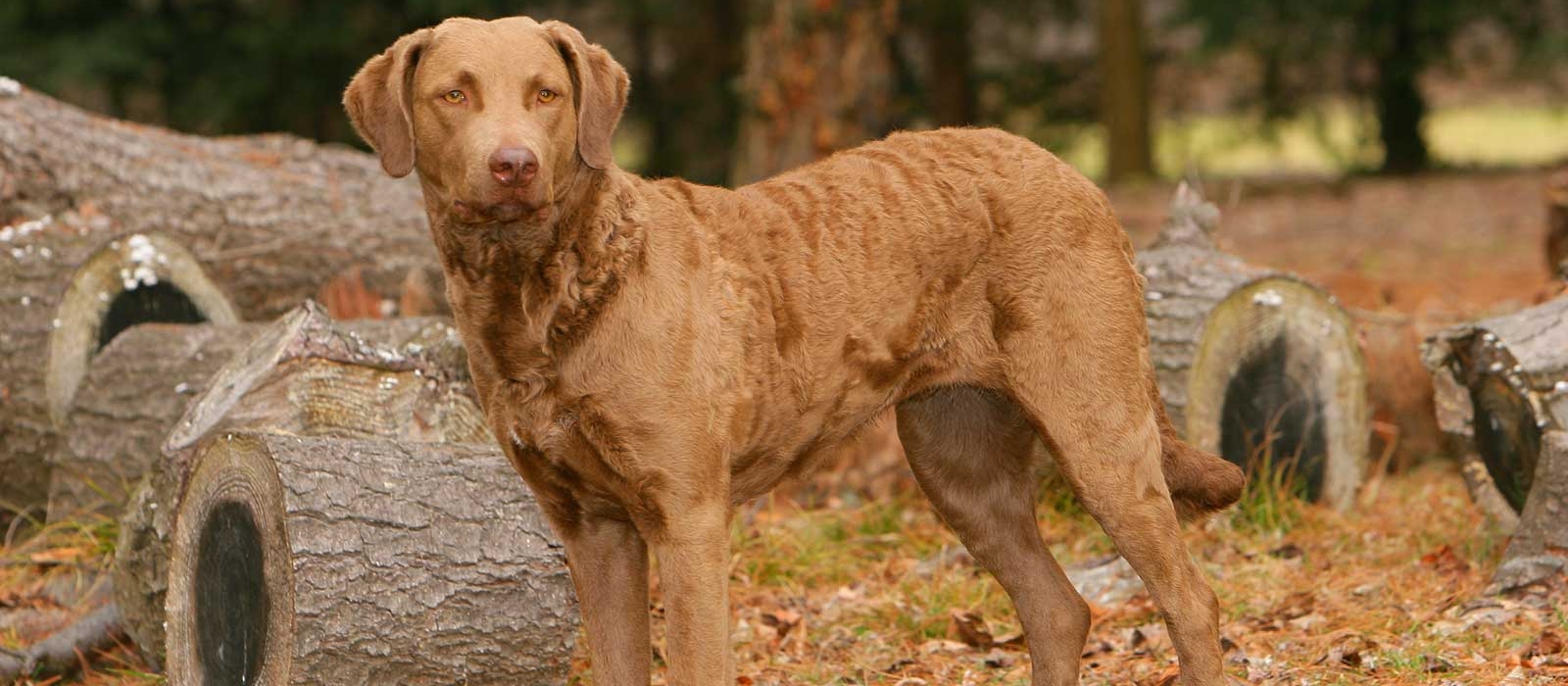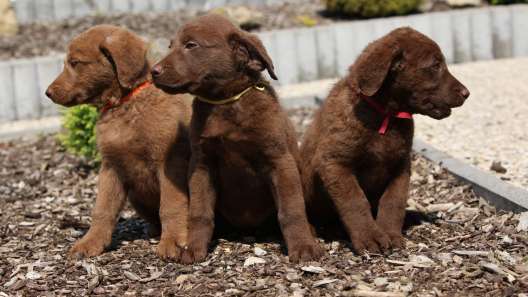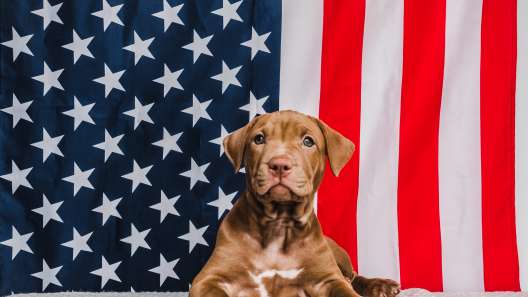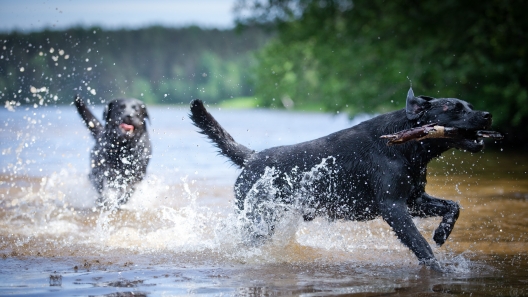-
Activity Level:
high
-
Shedding Level:
moderate
-
Grooming Level:
moderate
-
Trainability:
moderate
-
Good for Novice Owners:
moderate
-
Adaptability:
low
-
Kid/Pet Friendly:
often
-
Prey Drive:
moderate
-
Watchdog:
aware
- Average Size: Medium
- Average Lifespan: 10-12 years
- Registered?: aca, akc
Chesapeake Bay Retriever Dog Breed Information
Overview
Temperament
Adaptability
Health
Owner Experience
Grooming
Activity Level
Size
Life Span
Did You Know?
The Chesapeake Bay Retriever is a well-rounded sporting dog on land or in water. Known for its assertive nature and general toughness, the “Chessie” makes an incredible hunting dog and loyal companion.
The history of this breed is traced to an 1807 shipwreck off the coast of Maryland. Two St. John’s Water Dogs, also known as Lesser Newfoundlands, were rescued from the accident and made their homes with people in the bay area. The dogs, one male and one female, had numerous litters with other breeds, which eventually led to three different classes of “Ducking Dogs”.
In 1878, the Chesapeake Bay Retriever was recognized by the American Kennel Club and is a member of the Sporting Group. The Chesapeake Bay Retriever is one of 56 known canine breeds to originate in the United States. One of the facts about Chesapeake Bay Retrievers is that, because of the history linking this breed with the “Old Line State” of Maryland, the state adopted this breed as its State Dog in 1968.
A Chesapeake Bay Retriever is a generally friendly dog that is extremely loyal to their family and is affectionate with them. Well-socialized Chessies tend to get along well with children, dogs, and other pets in the family.
Early socialization with other pets and people is important with this breed as they can be wary of strangers at first. When well-socialized, they will often warm up once introduced. Some of the members of this breed are known to “grin” showing their front teeth. This is actually a sign of happy submissiveness as opposed to aggression.
A Chesapeake Bay Retriever is a moderately adaptable dog breed and is generally not a breed meant to live in an apartment or condo. They have a lot of energy, so they need room to run. They also get bored easily and require a lot of mental stimulation.
If they become bored, they can become destructive. They also bond closely with their families and do not like to spend long periods of time alone. Their dense double coat allows them to tolerate cold weather better than many breeds. This dog is well suited to hunt or live in basically any climate, but be careful with extreme heat.
Potential health concerns to be aware of in Chessies can include hip dysplasia, elbow dysplasia, epilepsy, chondrodysplasia, Von Willebrand’s disease, and progressive retinal atrophy. Good breeding practices and the health of the parents make a big difference in the health of Chesapeake Bay Retriever puppies.
Reputable breeders will screen their dogs to make sure they are not passing preventable issues to puppies. Make sure you ask them about the health and genetic history of both parents. You can also ask about health tests or clearances that have been done.
Chessies are also a barrel-chested dog breed, which means they are at a higher risk for bloat. Bloat in dogs, also called Gastric Dilatation-Volvulus, can be dangerous and quickly becomes fatal if gastric torsion occurs (i.e.; if the stomach flips). Because of this, it’s important to know how to reduce the risk of bloat in your dog and to know what symptoms mean that it’s time to get to the emergency vet.
This is a hunting breed through and through, so they possess great stamina and athleticism. While, at times, the Chesapeake Bay Retriever’s hunting ability can cause them to be overzealous, consistent training will help curb this.
Giving them something to do, like field activities or dock diving, can make them an extremely well-balanced and exceptional dog. Although these dogs are intelligent and eager to please, they can also be quite stubborn, which can be a challenge for novice dog owners.
Novice dog owners can do well with this breed if they are consistent. Puppy training classes are recommended. In addition to reinforcing training and socialization, puppy training classes can also help you build a bond with your dog.
The coat of The Chesapeake Bay Retriever is meant to allow this breed to endure cold temperatures and be able to retrieve fowl from frigid water. This means they have a water-resistant double coat and will shed a bit year-round and heavier as the seasons change.
Brushing these dogs will help to control some of the loose fur floating around, and it will make your dog happy! Brushing a few times a week and the occasional bath is usually enough to keep this dog’s coat happy and healthy. This is one of the dog breeds that tend to love water, so you may have trouble keeping them out of the water and will need to bathe them more often if they go swimming a lot.
In addition to coat care, you will also need to take care of your Chesapeake Bay Retriever’s nails, ears, and teeth. You should trim this breed’s nails once or twice per month. Weekly ear checks and careful cleanings when needed can help prevent ear infections. Brushing your dog’s teeth every day, in addition to cleanings at the vet when needed, can help keep your dog’s teeth healthy and prevent tooth decay and gum disease later in life.
This breed loves to run and play! They have a high energy level and will be willing to play for hours on end if you will. Daily walks plus some playtime and time to run are a minimum; and, they will likely be up for more activity if you are. They are playful, jovial dogs and will love a good game of fetch or a morning jog.
If you get near the water, be prepared for your Chesapeake Bay Retriever to take a dip, as there are few breeds who love the water more than this one. Just make sure you keep activities low-impact until puppies finish growing to avoid damage to developing bones and joints.
Fully-grown Chesapeake Bay Retrievers usually stand 20-28 inches tall and weigh 50-80 pounds.
Chesapeake Bay Retrievers generally live for 10-12 years on average.
The Chessie is the official dog of Maryland; it was declared as such in 1964. Also, Chesapeake Bay Retrievers have been owned by General Custer, President Theodore Roosevelt, which makes them a popular presidential pup, and other notable historical figures.









